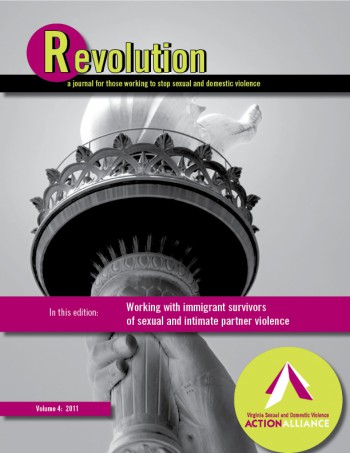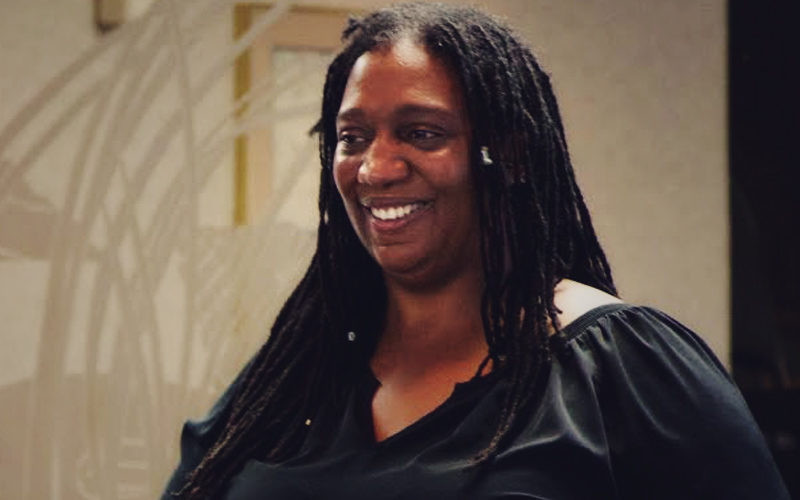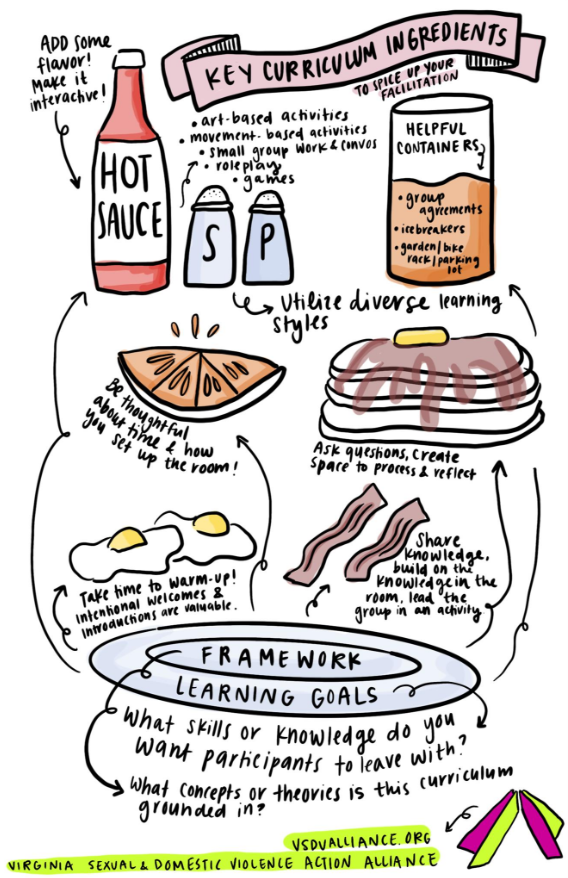Resources Library:
Start a Search:
Journal: Revolution: Working with Immigrant Survivors of Sexual and Domestic Violence

A journal for professionals working with victims/survivors of sexual and domestic violence. Volume 4 addresses working with immigrant survivors, and includes the following topics: Improving Your Program's Accessibility to Immigrant Survivors; Legal Clinics Help Immigrants Understand Their Rights; Immigrant Programs and Services; Power and Control Tactics Used Against Immigrant Women; Cultural Proficiency Continuum.
Volume 4; January 2011.
Published by Virginia Sexual & Domestic VIolence Action Alliance.
24 pages.
Keeping Your Cup Full: Self-Care is Essential to Trauma Informed Advocacy
Self-care is essential to providing trauma-informed advocacy. This webinar will offer strategies for dealing with daily work related stress, will increase awareness of the issue of vicarious trauma, and will provide ideas in order to gain organizational support to help sustain and support those working with survivors of trauma.
 Presenter: Vanessa Timmons is the executive director of the Oregon Coalition Against Domestic and Sexual Violence and presented several workshops at the 2016 Warmth of Other Suns Conference held by the Action Alliance in August. She is an accomplished writer, activist, and storyteller dedicated to exploring the healing power of words. She recently completed her guided journal The Way of The Heroine.
Presenter: Vanessa Timmons is the executive director of the Oregon Coalition Against Domestic and Sexual Violence and presented several workshops at the 2016 Warmth of Other Suns Conference held by the Action Alliance in August. She is an accomplished writer, activist, and storyteller dedicated to exploring the healing power of words. She recently completed her guided journal The Way of The Heroine.
To access this webinar and other important materials, please click here.
Key Curriculum Ingredients to Spice Up Your Facilitation

Key Elements of Addressing Gender-Based Violence on Campus
All college students have the right to learn and live in an educational environment where they are safe and treated equally. This is the overarching spirit of federal and state legislation, like Title IX, governing campus gender-based violence response and prevention efforts. It is also a core belief of the Virginia Sexual and Domestic Violence Action Alliance and our partners on Virginia’s Campus Task Force.
This resource can be used as a starting place, or a set of benchmarks, for campus advocates, police, Title IX coordinators, and administrative staff and partners who are considering how Virginia's colleges and universities can engage in comprehensive, trauma-informed, and effective responses to gender-based violence.
The Virginia Sexual and Domestic Violence Action Alliance offers the following recommendations based on more than 35 years of work with students, campuses, community advocates and national leaders dedicated to building an effective response to gender-based violence and sexual assault.
Key Findings from ‘Sexual Violence Victimization and Associations with Health in a Community Sample of Hispanic Women’
Sexual violence can result in many health, economic, and social struggles in the lives of survivors. This resource highlights findings from a 2015 study on sexual violence against Latina women. Findings can help strengthen our prevention and response strategies with Latin@ communities.
En Español: Esta traducción resume los principales hallazgos del estudio “La victimización de Violencia Sexual y de las asociaciones de la salud en una muestra de la comunidad de las mujeres hispanas,” realizado por K. C. Basile, S.G. Smith, M.L. Walters, D.N. Fowler, K. Hawk y M.E. Hamburger. Los hallazgos del estudio se basan en nuestra comprensión de los efectos de la violencia sexual en mujeres latinas y pueden orientar nuestras estrategias tanto de prevención de la violencia sexual como de respuesta a ésta.

